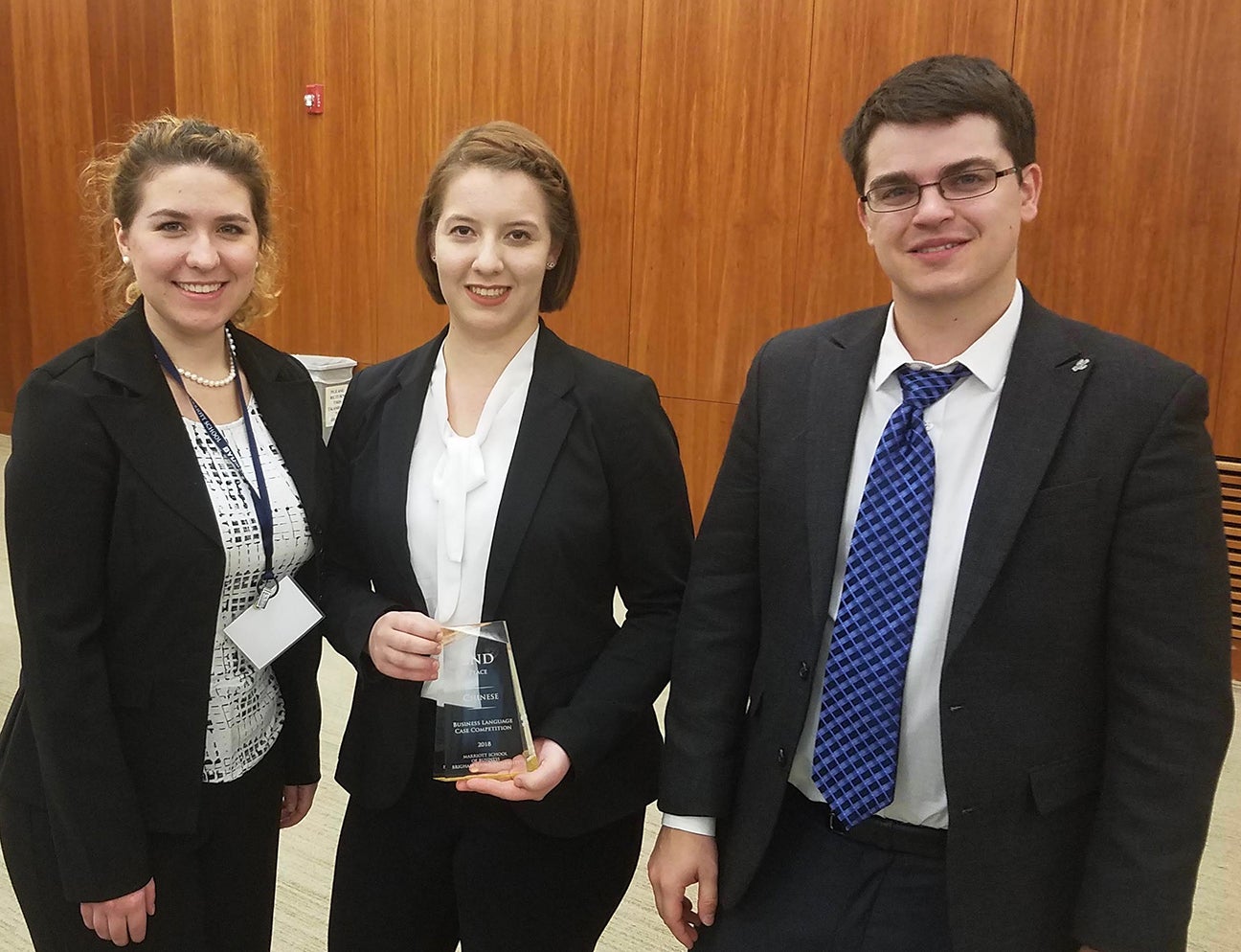KINGSTON, R.I. – Jan. 9, 2019 – A team of students from the University of Rhode Island College of Business and the Chinese Flagship Program captured second place at the annual BYU Business Language Case Competition – the fourth straight year a URI team has finished in the top three at the event in Provo, Utah.
The competition, hosted by Brigham Young University’s Marriott School of Business, gives undergraduates the opportunity to present a business case in Chinese, Spanish, French or Arabic. Students, non-native speakers of the language, are judged on their business plans, language skills and presentations. The URI team competed against students from BYU, Indiana University, the University of Washington, West Point, the University of North Georgia and Northeastern University.
URI’s team was made up of Grant West ’19, of Decatur, Georgia, and Sarah Chambers ’20, of Carlisle, Pennsylvania, both global business management majors, and Verity Cheslo ’20, of Burlington Township, New Jersey, a major in supply chain management.
“All of the students are double majors in business and language. I think that’s a huge advantage,” said Jerry Xia, assistant professor of marketing at URI and adviser to the case study team the last three years. “There are students from other universities in the competition that have very good Flagship programs in Chinese, but they’re not business majors. They can present very well in Chinese, but because of the business analysis, I think our students are definitely better, and in terms of Chinese, our students are also very competitive.”
All three students are members of URI’s Chinese Language Flagship Program, a highly successful language program funded by the U.S. Department of Defense. One of just 12 such programs in the U.S., the Flagship program prepares students from any major to achieve a professional level of proficiency in the Chinese language. Students graduate with a bachelor’s degrees in their chosen field and in Mandarin Chinese.
This year’s BYU case study focused on Utah-based Taft Clothing, a high-end men’s footwear company. Started three years ago by two BYU graduates out of their small apartment, Taft has grown into a multimillion-dollar online business, shipping shoes and boots mostly within the U.S. Students were asked what country, if any, would be optimal for Taft’s plans to expand outside the U.S. The question required students to analyze perspective countries for such factors as infrastructure and shipping, branding and marketing, regulations and policies, and culture and income, said Xia.
“The case study was quite hard this year. There wasn’t a lot of information provided on the company and we only received the case study one week before the competition,” said West, who was also a member of URI teams that finished second in 2017 and third in 2016. “We had to analyze different markets as well as how Taft marketed its products. All the research had to be done through third-party information.”
The best option for expansion? The URI team chose the United Kingdom.
“We looked at a lot of economic factors,” said Chambers, also a member of last year’s second-place team. “World Bank statistics also showed expansion would be easier to the U.K. We also looked at the cost to start a business, the paperwork, the cost of importing and exporting goods into the U.K., which is incredibly low. Obviously, we looked into Brexit and how it would impact starting a business in the U.K., and we backed it up with statistics.”
The toughest part was devising a supply chain strategy for Europe. “Verity provided an amazing background in supply chain,” said West.
Taft manufactures its footwear mostly in Spain and currently ships within the U.S. from a Utah warehouse. Using an analysis relying on the cost and weight of shipped goods, Cheslo pinpointed the best warehouse location for a U.K. expansion.
“We determined they should have a hub in France,” she said. “I also googled France and found it has a big logistics network and is known for being a very big supply chain center in Europe. France is a little bit more central, and if everything goes well in the U.K., they could expand to France and Germany and still have one main warehouse.”
Coming up with a business plan was just part of the competition. The plan – along with supporting documents and graphics – had to be presented in Mandarin. “It’s a great hands-on opportunity to combine both majors, which can be a little hard sometimes,” Cheslo said.
In meetings to research and prepare their presentation, the students spoke exclusively in Chinese. Research, done in English, had to be translated into Chinese and new business terms had to be mastered. But, Chambers said, a lot of the language came naturally. “I give a lot of credit to Flagship, they make you think in the language.”
“A lot of language programs are half language, half culture,” added Cheslo. “Flagship is all language, 24/7. It’s very much about immersion. They really drill on getting you as fluent as possible.”
In the past, advisers to the case study team included a Chinese language professor, but this year Xia advised students on both their business analysis and language. “Professor Xia put in so much time and effort on the competition,” Chambers said. “He was an amazing resource to have. He was incredibly helpful.”

